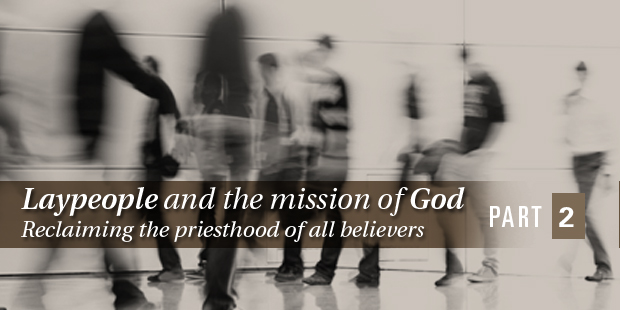
Laypeople and the Mission of God, Part 2
Today I continue my series about laypeople and the mission of God. If you missed the first post in the series about killing the clergy-laity caste system, you can find it here.
In the first church I planted we did something strange, but we were tying to communicate something important. In the Sunday program, normally you would print the name of the church, phone number, and the obligatory: “Ed Stetzer, Pastor.” Instead we listed everybody. I was listed as the pastor but we included the greeters, the children’s ministry coordinator and a host of other ministers– since all God’s people are the ministers. What I learned was that was a nice thought, but it takes much more than an announcement.
Every church must have a strategy and a process to equip people for ministry and mission. Thus, they create an environment where people are empowered and enabled to do ministry. Yet, and perhaps this is the greatest challenge in many churches, you have to recognize that there are many factors working AGAINST engaging all God’s people in ministry.
There is a role for leadership, but we cannot miss the reality that, in most churches, there are many more passive spectators than there are active participants in the mission of God.
The question: why?
Well, there are many reasons, but one is this: pastors and attendees want it that way. They may bemoan passivity, but they empower it personally.
Let me start with the attendees.
Anthropologists tell us that “religion” is a universal cultural reality. Every culture creates a religion. We find religion all around the world, in every culture.
The religions they create have at least two characteristics:
- people create religious rituals to ceremonialize their devotion
- people create a religious hierarchy to outsource their religious obligations
So, the default mode of culture and people is toward ceremony and hierarchy, rather than devotion and ministry engagement.
(Note: I am not addressing liturgy here, but rather cermonialization– where the rituals replace the relationship.)
Christianity is not another created religion, but we should note the fact that every created religion has these characteristics in common. In other words, these forces are so powerful that they are, well, everywhere. But, Christianity is so radically different– or at least it is supposed to be– that it would show another way.
Yet, it is important that we recognize the nature of people and the constructs of culture both push away from the idea of all of God’s people are priests (1 Peter 2:9) and ministers (1 Peter 4:10). We don’t want a priesthood and ministry of all believers. Instead, we want people to go to God for us and leaders to do the ministry to us– that is the default condition of the heart. It is the religion that we seem to crave– yet it is not Christianity, at least not biblical Christianity.
So, my point is this. To deal with the issue you have to fight against the causes. Biblical leadership (and, as I will address later, church offices) are put in place by God for the purpose of “for the training of the saints in the work of ministry, to build up the body of Christ” (Eph. 4:12). Yet, too often they (we) are perpetuating the system they bemoan.
Which leads to addressing the reasons pastors often disempower the priests.
Many pastoral leaders enjoy (and take their identity from) doing the work of the ministry more than training and equipping all God’s people to do that ministry– that hurts the pastors and the people. Some pastors are concerned about their employment, wondering, “If I train them for the ministry then why would they need me.” Others are concerned about their identity asking, “What do they need me for if they do the ministry?”
This is a tricky topic and, to be honest, many of the commenters on the last post seemed upset at pastors. So, lest I be misunderstood, let me be clear: I love pastors. But, I love pastors enough to say, “You are to equip God’s people for ministry, not be the shopkeeper of the religious store providing religious rituals to ceremonialize devotion a religious hierarchy to outsource people’s religious obligations.”
That requires some shifts in how we do ministry.
More on that in Part 3.
Read Part 1 from this series here.
Read more from Ed here.

Tags: Clergy-Laity, Ed Stetzer, Serve, Staff, Structure













